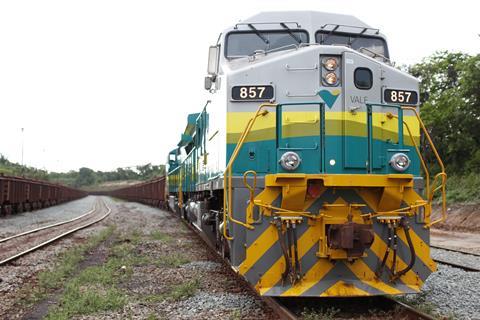
BRAZIL: Mining group Vale SA is equipping the Estrada de Ferro Carajás with 4G internet in partnership with telecommunications specialist Vivo. Due to be completed by 2025, the installation is expected to improve safety and efficiency at a cost of R$240m.
Forming the core of a major communications upgrade along the 892 km line between mines in the Serra do Carajás and the deep-water port at Ponta da Madeira near São Luis, together with the 101 km branch serving the S11D iron ore deposit, 4G will allow all communications on the 1 600 mm gauge railway to be switched from analogue to digital. Real-time video transmission will be available for train crews, giving drivers the ability to see the status of track and equipment along the route.
Information generated by telemetry on train performance will be available in real time along the entire railway, and staff will benefit from more stable mobile phone communications.
So far 27 communications masts have been installed, and these will be followed by 49 more, together with related equipment. Connectivity to EFC’s regular passenger service will be enhanced, and communities along the route are expected to benefit as well.
Vale CEO Eduardo Bartolomeo said that ‘this initiative is in line with our commitment to invest in projects of shared value with society. It meets not only Vale’s needs ― modernising the technology used to exchange data during the movement of trains ― but also those of the communities.’
Vivo Vice-President of Business Alex Salgado asserted that ‘our private network project plays a leading role in the materialisation of initiatives that accelerate industrial digitalisation, leveraging technologies such as IoT, big data, artificial intelligence and analytics within the operation, transforming data into intelligence, ensuring greater safety, cost reduction and efficiency gains’.
All 15 passenger stations along the route will have a free internet signal by the end of 2024; the first five stations to be equipped will be São Luís Vitória do Mearim, Santa Inês, Açailândia, Marabá and Parauapebas.
EFC and Vivo are keen to emphasise how much communities along the route will benefit. Around 280 free internet access points will be provided at busy locations where there are schools, hospitals and other community facilities. Vale is currently in discussion with local representatives to determine which locations will be offered access.
João Júnior, Operations Director at EFC, said that ‘since the project was conceived, we have combined the need to modernise the railroad’s communications with meeting a legitimate demand from the communities, which is to have greater access to digital telephony in the region’.

















